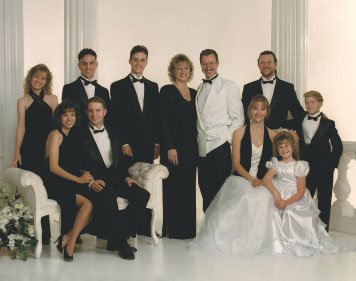articles/Portraiture/cameraroom-page1
Back into the Camera Room by Dave Newman - part 1 of 1 2
by Dave Newman Published 01/12/2002

Basic layout and Design of a working Camera Room
(for Digital Capture or Conventional Film)
IN1569 Leonardo Da Vinci stated " one should contemplate the science of art, but also, the art of science". I would add, a portrait photographer should look at photography as an art but also study the techniques of the photographic process.
Leonardo was a designer, architect, inventor, engineer, mechanic, physicist and then an artist. He constantly questioned the "HOW TO" concept of the tasks placed before him, and he didn't just read a book about human anatomy, for example, he dissected 30 bodies. . . thus, through experience we discover and establish a working knowledge. By this, I allude to my experience, linked to the need to establish a working technical environment that works adequately for us as well as towards a client-satisfying photographic product. We must justify our existence with time tested methodology to produce not only income with little perspiration but a salable product. Da Vinci said, "look at the daily challenges before you, write down in the middle of a sheet of paper the suitable end result desired, then add, in a circular fashion, all the words terms and phases around it involved in the desired result". So, fill up your mind and fill out your plan. Then come to terms with results based on your camera room's daily requirements.

With the camera room it is the same; I ponder all the portrait assignments, which makes us "tick" at Newman Photography, and then lay out a basic working camera room with savvy. The plan is simple, the results are artistically satisfying , and the PE formula (Profit from Effort) is paramount. While Leonardo called this mind-mapping, the studio portrait photographer could call it simply working smarter.
What do we wish to accomplish with this camera room for all seasons? As expressed in my four text/manuals on the subject, I wanted a "do all", "do everything" working camera room based on four criteria:
Speed
Efficiency
Consistency
Creativity
Keeping it Simple The less complicated the camera room can be, the better off we are in our workaday world of portraiture. We have much, much more to think about than wires, cords, light stands, and meter readings. One of the main objectives of this article will be to provide you with a basic plan for a simple system that converts rapidly from one type of client to the next. The working camera room as explained in the next few paragraphs will, indeed, show a pattern for such a workshop where image variety is the question and simplicity is the answer.
Every effort is now made to facilitate moving with ease and simplicity from a 10:00 AM session of 22 people to an 11:00 AM bridal session to a I:00 PM couple to a 2:00 PM session of a high-key child's portrait to a 3:00 PM session of a window-light request to a 4:00 PM session of a model's glamour head-shots to a 5:00 PM session of a small product commercial shot...whew! Can it be done? Yes, it can, and it can be done with minimum effort if your requirements for perfection are not too great and you're willing to sacrifice slightly on the optimum lighting. You'll only need 3 minutes to setup between appointments, which means more appointments per day, and more time spent with the client, rather than with the meters, wires, cords, reflectors and tripods . Get the picture? Briefly, here, I wish to convey the highlights of my book "The Portrait Camera" room in a condensed, Dave newman Picturebut meaningful manner.
You are currently on page 1 Contact Dave Newman
1st Published 01/12/2002
last update 09/12/2022 14:52:06
More Portraiture Articles
There are 0 days to get ready for The Society of Photographers Convention and Trade Show at The Novotel London West, Hammersmith ...
which starts on Wednesday 14th January 2026





